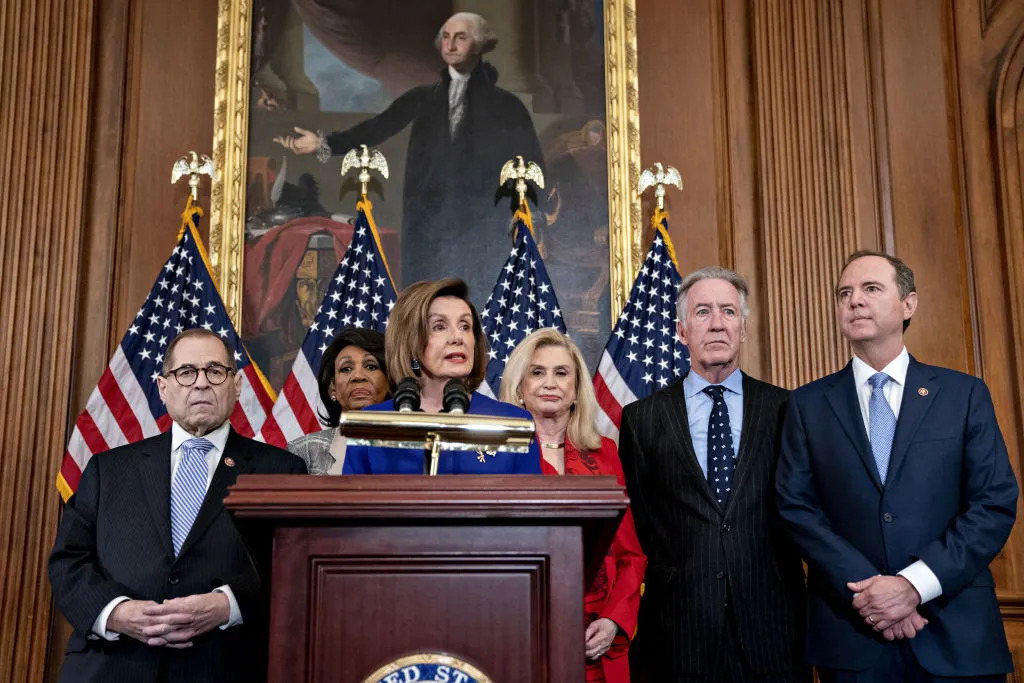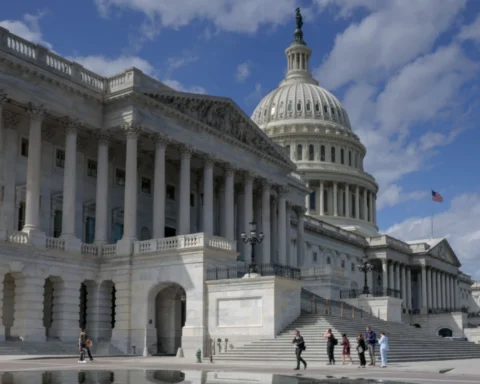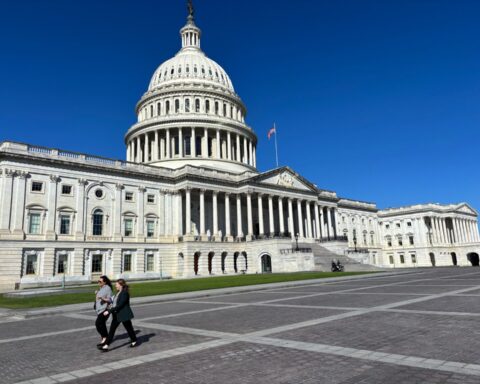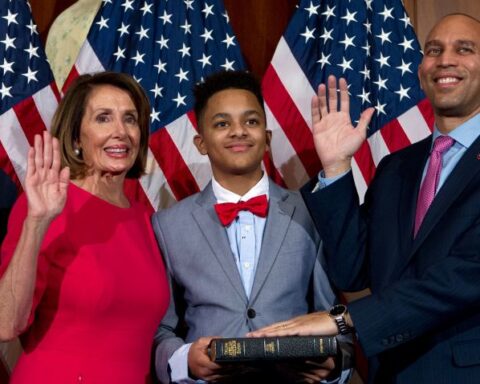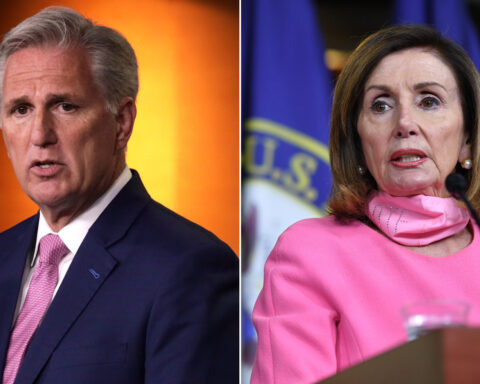House Democratic leaders on Thursday were once again forced to push back the timeline for a vote on a $1 trillion infrastructure bill, a sign of ongoing divisions within the party and a major blow to President Joe Biden and party leaders eager to show they can deliver on their agenda.
The decision to delay the vote came just hours after Biden appealed directly to House Democrats in a closed-door meeting on Capitol Hill, pitching them on a framework for a separate, larger climate and economic package.
The problem for party leaders is that progressives made clear they would not vote for the infrastructure bill unless the larger bill moves in tandem and said a framework was not enough to win their votes. That bill has not yet been finalized or publicly signed off on by all Senate Democrats.
Delaying the infrastructure vote is a significant setback for Democrats with Biden making clear privately for more than a week he wanted an agreement and passage of the bipartisan measure before he arrives at a UN Climate Conference on November 1. Biden departed for his foreign trip later in the day on Thursday.
Speaker Nancy Pelosi had told House Democrats earlier Thursday not to “embarrass” Biden by voting down the infrastructure bill during Biden’s trip overseas.
This is the second time in two months that House leadership has had to delay the infrastructure vote after a similar scenario played out at the end of September. For now, it’s unclear how long the vote on the bipartisan infrastructure bill will be delayed.
Amid resistance from progressives over moving ahead with the infrastructure bill, the House instead voted Thursday night to approve a short-term extension of highway funding.
The transportation bill vote was needed to avoid a lapse in funding for transportation projects starting Monday. The Senate agreed by unanimous consent that once the House passed the extension, it would be deemed passed by the Senate as well.
House Majority Leader Steny Hoyer’s office sent a notice that the transportation extension vote would be the last of the week.
Hoyer later told reporters that “yes” he is disappointed they weren’t able to vote on the infrastructure package.
Asked if it would take until December 3 to pass it, which is when highway funding would lapse after the stopgap was passed, Hoyer said, “no, I don’t think,” it will take that long.
On when they will finally vote on the infrastructure bill, he said, “I hope soon.”
Some moderates expressed frustration over yet another delay, arguing that the bipartisan infrastructure bill should be passed now. That’s especially a concern for some vulnerable incumbents looking for a tangible win as they head into the midterm elections.
“Unfortunately, a small number of Members within our own party denied the President — and the American people — a historic win,” Democratic Rep. Stephanie Murphy of Florida, the co-chair of the Blue Dog Coalition, said in a statement. “We are extremely frustrated that legislative obstruction of the BIF continues—not based on the bill’s merits, but because of a misguided strategy to use the bill as leverage on separate legislation.”
Reps. Tom Malinowski of New Jersey and Dean Phillips of Minnesota both expressed deep frustration with their party’s handling of the infrastructure vote — and voted in protest against the short-term extension of transportation funding.
“I’m concerned about Virginia, I’m concerned about the message. I’m concerned about the message it sends to the world right now that is looking at our system of governance with increasing concern about its viability,” Phillips said, alluding to Tuesday’s gubernatorial election in Virginia, where Democrats had been hoping a legislative win for Biden would help boost Democratic nominee Terry McAuliffe.
Malinowski, whose district is targeted by Republicans, said of delaying the vote: “It is frustrating to a lot of us that we are now in a game of ‘who goes first’ when all sides seem to be in agreement on the substance. The country has been begging for this, my constituents have been begging for this.”
Biden pitches Democrats but falls short
During the closed-door meeting with House Democrats, Biden laid out in person long-awaited details of his $1.75 trillion economic and climate package, trying to convince progressives who are skeptical of anything short of a fully written bill and commitments from all 50 members of the Senate Democratic caucus to back his framework.
But he came up short, with progressives still demanding that both bills move in tandem.
Phillips was critical of Biden because he did not explicitly say the infrastructure vote should occur on Thursday in the meeting; Pelosi is the one who pushed for the vote.
“I’m not afraid to say I wish he was more explicit. … This is the commander in chief of the United States. When you spend political equity in front of a caucus two times in a month, I think it’s got to be awfully explicit — and be more forthright.”
Phillips added: “If the President had led us down that hallway onto and on the House floor, I think it would have been close. …. I think with Republican votes, it would have passed.”
The personal pitch to House Democrats marked a concerted effort by the President to wrest control of an unwieldy process that has led to significant revisions to Democratic goals in the effort to appease Sens. Joe Manchin Manchin and Kyrsten Sinema. While Biden’s proposal isn’t finalized in its entirety, days of negotiations have brought it to a place where the key elements are all locked in.
Not all Democrats have signed off on the framework that Biden announced Thursday morning, two people familiar with the plan cautioned, but the President believes it’s a consensus all Democrats should be able to support.
Neither Manchin nor Sinema explicitly committed to backing the plan Thursday, though they both said they were continuing to negotiate after Biden’s meeting with House Democrats.
Sinema reacted to the framework by saying in a statement, “We have made significant progress” and “I look forward to getting this done.”
Manchin was noncommittal when asked by reporters whether he will support the framework agreement. Later on Thursday, he said, “We haven’t seen the text yet. Everyone has to see it. I don’t think anybody could say they could support it until they see the text.”
Notably, however, Manchin signaled support for a $1.75 trillion top line for the package.
Asked by CNN if that price was too high, he said, “No,” adding, “That was negotiated.”
This is the first public indication that Manchin will accept a price tag higher than $1.5 trillion, which he had previously said was the figure he was willing to settle on.
And despite the scrapped infrastructure vote, the White House expressed optimism that both bills would eventually pass. “Legislative text is starting to become public, and the road to passing both critical parts of the President’s plan to make our economy deliver for middle class families—not just the wealthy—is clearer than ever,” White House press secretary Jen Psaki said in a statement Thursday evening.
‘We are going to pass both bills’
As she left the final House vote of the night, Rep. Pramila Jayapal — the chair of the Congressional Progressive Caucus, who has said that just having a framework on the larger spending plan is not enough — told reporters, “We are going to pass both bills.”
“The President said he believes he’s got 50 votes in the Senate and I think it’s a lot for him to say that,” the Washington state Democrat said. She has made clear, though, that progressives want a vote on both bills in the House at the same time.
Earlier in the day, after a separate meeting with House progressives, she had said, “Everyone in the room enthusiastically endorsed a resolution that approves in principle the framework the President laid out today.”
“We intend to vote for both bills when the Build Back Better Act is ready,” she said, referring to the larger climate and economic package. But, she added, “we do need the vote on both bills in the House at the same time.”
“We have 96, 98% of the caucus on the same page,” Democratic Rep. Alexandria Ocasio-Cortez of New York said. “We just need to figure out what these two folks are willing to commit to and once we get real clarity on that, on what is a yes, then I think we’ll be able to move forward,” she said of Manchin and Sinema.
Senate Democrats cannot afford to lose a single vote to pass the bill under a process they plan to use known as budget reconciliation.
That dynamic has given every single member — and in particular, moderates including Manchin who have pushed back on a number of the original proposals for the package — an outsized influence over the process.
Biden departs for Europe
After his visit to Capitol Hill, Biden delivered public remarks on the framework.
“Today I’m pleased to announce that after months of tough and thoughtful negotiations, I know we have a historic economic framework,” Biden said.
“It’s a framework that would create millions of jobs, grow the economy, invest in our nation and our people, turn the climate crisis into an opportunity and put us on a path not only to compete, but to win the economic competition for the 21st century against China and every other major country in the world,” he said.
Biden later left for Europe for the Group of 20 Summit in Rome. Climate is a topic Biden is expected to discuss Friday morning during an audience with Pope Francis in a historic meeting. Later, he plans to deliver a major climate speech when visiting the COP26 summit in Glasgow.
The trip presents a major moment on the world stage for the President that has added urgency to the push for a deal and a House infrastructure vote.
What’s in the framework
The $1.75 trillion proposal focuses on care for families, addressing the climate crisis, expanding access to health care, lowering costs for the middle class and tax reforms.
The new plan makes major concessions and does not have several key planks that Biden had initially proposed, including paid family and medical leave, prescription drug pricing provisions, free community college and vision or dental Medicaid coverage.
It does include provisions to help families with childcare and caregiving, including free and universal preschool for all 3- and 4-year-olds, which amounts to the biggest expansion of public education in 100 years, according to the White House.
The largest portion of the framework focuses on climate and would include the largest legislative investment in combating climate change in US history, according to the White House. As part of that, there would be $320 billion for clean energy tax credits. This includes 10-year expanded tax credits for utility-scale and residential clean energy, transmission and storage, clean passenger and commercial vehicles and clean energy manufacturing.
On health care, the plan would close the Medicaid coverage gap and deliver health care coverage through Affordable Care Act premium tax credits to certain uninsured Americans. It would also expand Medicare coverage to include hearing services.

